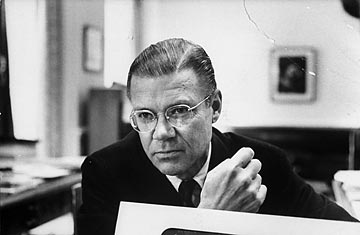
Robert Mcnamara
At the beginning of his professional career, he made a name for himself as the wunderkind who reformed the ailing Ford Motor Co. At the end, he tried to rehabilitate his reputation, as a do-gooder striving to save the globe's poorer nations as head of the World Bank. But Robert McNamara, who died early Monday morning in his sleep at home at the age of 93 (his wife Diana told the Associated Press he had been in failing health for some time), will always be best known for his role as the architect of Washington's failed Vietnam policy in the 1960s.
McNamara waited 30 years before conceding in his 1995 memoir, In Retrospect: The Tragedy and Lessons of Vietnam, that he had waged the war in error. "My voice would have had no impact at all at that point," he told TIME when the book came out, explaining why he hadn't revealed his doubts when he stepped down as Secretary of Defense in early 1968. "My voice would have had no impact whatsoever."
But to the baby boomers who came of age during the Vietnam War, McNamara's actions at the time spoke louder than the words of contrition he would utter three decades after 58,000 Americans had lost their lives in Vietnam. In their youth, they referred to the Vietnam conflict as "McNamara's war." Tens of thousands of them marched to protest against it in Washington, while thousands of young men burned their draft cards or fled to Canada to avoid the draft. One poured gasoline on himself outside McNamara's Pentagon window in 1965 and set himself ablaze, dying to protest the war.
When President John F. Kennedy put McNamara in the Pentagon, he gave him two orders: strengthen civilian control of the military and make the nation's armed forces work better. McNamara, educated at the University of California, Berkeley and the Harvard Graduate School of Business, tilted power away from the uniformed Joint Chiefs, who had held sway during the Truman and Eisenhower administrations, and toward his own team of brainy young civilian experts. McNamara's "whiz kids" engaged in the kind of "qualitative analysis" he had used to turn Ford around and which he believed would lead to a better and less costly military. But their approach didn't work so well during peacetime — McNamara spent a lot of time developing a "flexible response" strategy for nuclear war — and, combined with overly compliant military leaders during Vietnam, his team failed miserably.
McNamara stepped down in 1968 to run the World Bank. During his 13 years there, he tripled the bank's loans to developing nations and focused its funds on rural development. Perhaps most important, he helped the international community see that the world's poorest citizens needed food and shelter more than huge industrial projects.
But the publication of the 1995 memoir revived the debate over his role in the war. McNamara admitted in his book that the U.S. government had never answered key questions that drove its war policy, such as whether the fall of Vietnam would lead to a communist Southeast Asia and if such an occurrence would really have posed a grave threat to the West. "It seems beyond understanding, incredible, that we did not force ourselves to confront such issues head-on," he wrote. He said he wanted to help prevent the country from making similar mistakes in the future and that he fretted that just as Washington misperceived Vietnam a generation ago, it remained in danger of making a similar mistake. "We ought to learn the history of the Muslim religion," he told TIME in 1995. "Most Americans don't know the difference between the Sunnis and the Shi'ites, but we need to know that because that's going to be a major issue in the world of the future."
McNamara continued to wage his campaign to make amends for Vietnam through the end of his life, most notably in Errol Morris' Oscar-winning 2003 documentary, The Fog of War: Eleven Lessons from the Life of Robert S. McNamara. And he was a vocal critic of the Bush Administration's war in Iraq. Still, there were those who found it hard to forget or forgive his handling of the war he helped lead. Inevitably, its failure is now his epitaph.
